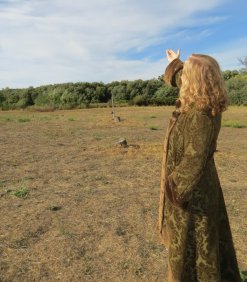Here are some of the best tools I’ve found for learning your way around the sky and becoming connected with the universe. Enjoy!
Star Walk app
You can use this app both to identify what you’re seeing in the sky, as well as to see what the sky looked like when and where you were born (you’ll need to correct for any difference between the time zone setting of your device and where you were born).
For iPhone and iPad OR For Android
Star Wheel ~ Planisphere
This is a great tool for learning the sky, and mainly how I learned the stars and constellations. You can dial in the date and time and tilt it up in the correct direction and see what you can see. The Bright Star version shows less stars and so would be good if you live in the city. I like the regular Star Wheel. Choose the 30, 40, or 50 degrees North version that is closest to your latitude (or 30 degrees South if you’re in the Southern Hemisphere) so the stars look as close as possible to what you’ll see.
Purchase a Planisphere Here
OR
Learn to Make a Star Wheel / Planisphere Here
Red LED Flashlight
For looking at your star wheel or star map in the dark without ruining your night vision, you need a red flashlight. There are many varieties. I like the tiny keychain ones that you press to turn on and release for off, but also have a switch for steady on and off. I usually tie a long black string through the keyring so I can put it around my neck for ease of finding it! Also many headlamps have red light features.
My Favorite Red Keychain Light
Free Star Maps
You can get a pdf from Sky and Telescope magazine’s website, which has great star maps that are totally enough to get you started on learning the sky. Their website also has some other good basic info and interesting free articles as well. (I don’t personally recommend their magazine as it’s way sciencey.)
Getting Started in Astronomy Star Maps
OR
Skymaps.com free pdfs of star maps for each month, also list the main events to see in the sky that month.
EarthSky
This is a great website! And, you can sign up for daily science email updates that are very astronomy oriented. This site was founded and is run by a woman, and the staff is very balanced in men and women, which is really unusual in science and astronomy. There’s a great sensibility and focus here. Highly recommended. You can get lost in this site for weeks…
http://earthsky.org/
Constellations of Words
I’m such a geek for etymology, symbolism, and meanings. This is the website for you around the stars if the deeper storied layers call to you too.
http://www.constellationsofwords.com
Variety of Constellation Story Links
The constellation names on this site link to a variety of good resources for where the constellations are located, how they were named, how to find them, the science behind stars, and a ton more. Hat tip to Tina & Stacy Martin
https://www.halloweencostumes.com/constellations-mythology.html
Sleeping Under Stars & Planets Resources
A wide variety of good resources for where star and planet gazing, eclipses, and beyond…
Hat tip to Payton and Michelle Bass
https://naplab.com/guides/sleeping-under-stars-planets/
The Stars: A New Way to See Them ~ H.A. Rey
(who wrote the Curious George books)
This is a good book for learning how to see the constellations in ways that look more like what you see in the sky than most maps show (although the maps I recommended above are the closest to it, which is part of why I like them).
The Stars in Our Heaven: Myths and Fables ~ Peter Lum
This is a very old book written in the late 40’s, but you can find it used and I’d snap up a copy if you like the stories of the stars. This is the most indepth and readable book of stories that I’ve found. Great for kids and adults!

No comments yet.